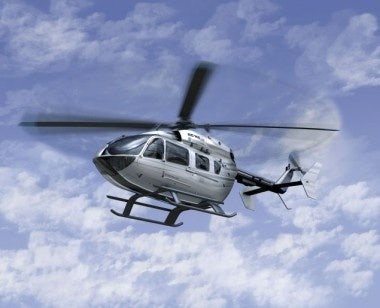Eurocopter To Partner With Wenzhou-Based Zhong'ou International Group#

Eurocopter and Zhong'ou plan to release their first luxury personal helicopters next year (Image: PR)
Shanghai Daily reports today that the Wenzhou-based manufacturer Zhong'ou International Group has signed an agreement with Eurocopter, a subsidiary of the European Aeronautic Defense and Space Company, to assemble private luxury helicopters in Jiangsu Province. According to the agreement, Eurocopter, the world's No. 1 helicopter maker, will provide spare parts and technical support, while Zhong'ou will produce the aircraft chassis and interiors. Projected to cost between 30 million yuan (US$4.55 million) and 60 million yuan ($9.1 million), the first helicopters, seating anywhere from six to eight people, are set to roll off the assembly lines next year.
Taken at face value, this story is interesting in itself, as it indicates the growing capacity of Chinese manufacturers to continue rising up the value chain, but going deeper, it also reflects what we've seen in other potentially lucrative manufacturing sectors. While Chinese producers have relied mostly on partnerships with foreign companies to develop their technical know-how, we are now seeing that Chinese manufacturers are hurrying to go it alone, likely in the hopes of exporting Chinese-made jets, helicopters and yachts in coming years. Though this may sound like a pipe dream at this point, Zhong'ou Chairman Wu Guolin has made quite clear that he sees his company's partnership with Eurocopter as a stepping stone to becoming fully self-sufficient.
While this deal looks like a win-win for Zhong'ou and Eurocopter -- as the former gains world-class expertise and the latter a foothold in the potentially lucrative Chinese private aircraft market -- the road ahead for private helicopters (like that for private jets) is fraught with ambiguities. Last year, Chinese media reported that most of China's estimated 200 private aircraft were flying illegally, as low-altitude airspace is tightly restricted by the country's military. However, authorities recently began a pilot program to loosen airspace restrictions in south China's Hainan Province, and government officials have hinted that the program will be extended nationwide by 2015. If low-altitude airspace is further liberalized, expect to see hundreds more business jets and helicopters zipping around the country, and Chinese manufacturers rushing to get their own aircraft to market. Late last year, Zhang Xin Guo, CEO of Aviation Industry Corporation of China (AVIC), said his company was looking to develop its own private jets, and was thinking of acquiring an existing international manufacturer to leapfrog its way into the industry.
While the development of the Chinese private aircraft industry may please manufacturers and the estimated 300+ RMB billionaires who told the Hurun Report that they have plans to buy a private jet or helicopter, it'll certainly have environmental groups wringing their hands. As the Global Times wrote last summer, the high carbon footprint of private aircraft relative to passenger planes or trains has led to government discussions about implementing a special "pollution tax," and has already led some wealthy businesspeople to swear them off completely:
Unlike [other] potential jet buyers, Zhang Yue, CEO of Broad Air Conditioning Co. Ltd, has given up such a luxurious privilege.
He said one tree absorbs 18.3 kilograms of carbon dioxide every year; the carbon dioxide my business jet produces from a 3,000-kilometer trip between Changsha and Beijing equals to the amount absorbed by eight trees for 60 years.
"Since I've known these figures, taking trips on my jet belonged to a past," said Zhang, who used to be a supporter of corporate jets, but his two jets have been left unused.